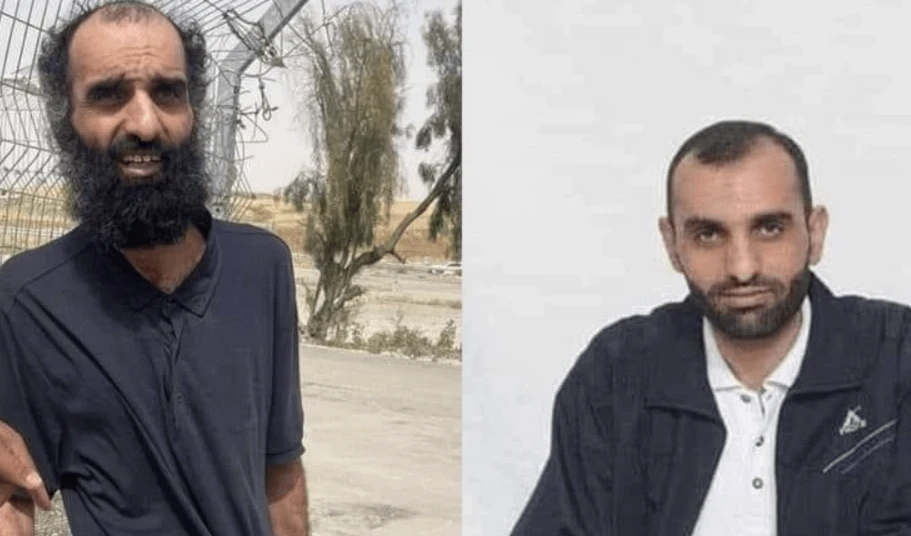Palestinian detainees in Israeli prisons face malnourishment: Haaretz
A report by Haaretz has exposed that the Israeli occupation's Prison Service has been systematically underfeeding Palestinian detainees as an alleged deterrence measure.
-

Former Palestinian prisoner Imad Jadallah from Dura, south of al-Khalil, before (right) and after (left) being released from Israeli occupation prisons on April 18, 2024 (Social media)
A report by the Israeli newspaper Haaretz has revealed that the Israeli occupation's Prison Service has been concealing the actual quantities of food provided to Palestinian detainees held in Israeli occupation prisons since the launch of Operation Al Aqsa Flood.
The revelation came to the forefront following a petition by the "Association for Civil Rights in Israel" (ACRI), which has brought this critical issue before the High Court of Justice, raising serious questions about the conditions under which these Palestinian detainees are being held.
According to the Israeli occupation's Police Minister, Itamar Ben-Gvir the reduction in food supplies was implemented as a deterrent measure. However, this stance was not included in the official response to the court.
Ben-Gvir, in a statement, claimed, "There is no starvation, but my policy does call for reducing conditions, including food and calories."
In turn, the Prison Service legal advisor, Eran Nahon, at the Israeli occupation's Bar Association convention stated, "They [Palestinian detainees] will receive the absolute minimum required by law and by the conventions to which Israel is committed," adding, "Not a gram more. This is a security purpose, but I don't rule out that it could be policy. Policy is not a dirty word."
During the court hearing, the High Court criticized the reduction of food, and Justice Daphne Barak-Erez noted the lack of a medical expert opinion approving the food reduction. Meanwhile, relatives of terror attack victims have expressed strong support for harsher prison conditions. Herzl Hajaj argued in court, "You should be representing us. You should be defending Israeli citizens and not terrorists."
During the court session, the High Court expressed alleged disapproval of the reduced food rations, with Judge Daphne Barak-Erez pointing out the absence of a medical expert's approval for such measures.
For months, Palestinian detainees have been released from Israeli occupation prisons, showing signs of significant weight loss and its severe effects on their physical and mental health.
At the same hearing, Israeli settlers who are relatives of those who settled in the Gaza Envelope and faced Operation Al Aqsa Flood voiced their support for stricter conditions for Palestinian detainees. For example, Herzl Hajaj made a pointed statement in court, calling for the slow death of Palestinian detainees through famine and medical negligence noting, "You should be representing us. You should be defending Israeli citizens and not terrorists."
Released Palestinian detainees recount horrors in Israeli jails
Palestinian detainees recently released by the Israeli occupation have spoken out about their ordeals at the hands of the Israeli jailers, including inhumane treatment and abuse.
Palestinians, who were detained by "Israel" without charges since the beginning of the war on Gaza, have retold harrowing tales of systemic mistreatment by prison personnel and reported being beaten by Israeli troops.
Speaking from Kamal Adwan Hospital in Gaza, they recounted violent and degrading treatment, including blindfolding and handcuffing inmates in small cages.
#BaderDahlan was released from Israeli prisons today after spending a month in custody.
— Al Mayadeen English (@MayadeenEnglish) June 20, 2024
Psychological and physical torture is apparent in Bader, who only spent a single month in Israeli prisons.
The systemic torture of #Palestinian prisons is deliberate and intended to break… pic.twitter.com/6m34JPclFK
"We have left but we call on you to get the rest out," implored former detainee Ataa Shbat from the Kamal Adwan Hospital in Gaza after his release.
Shbat expressed that many detainees thought they were presumed dead by their families.
"People are dying. Torture which you cannot imagine unless you taste it [experience it]. Suffering which you cannot imagine unless you experience it," he recalled.
Former detainee Aalam Hijazi stated that "prisoners were dying every day," as the lack of food and medicine was allowing diseases to "eat their bodies."
He recalled wearing the same clothing since the war began, citing that even the water was not appropriate to drink.
Read more: UN Committee accuses Israelis of sexual abuse, dehumanizing prisoners

 4 Min Read
4 Min Read








